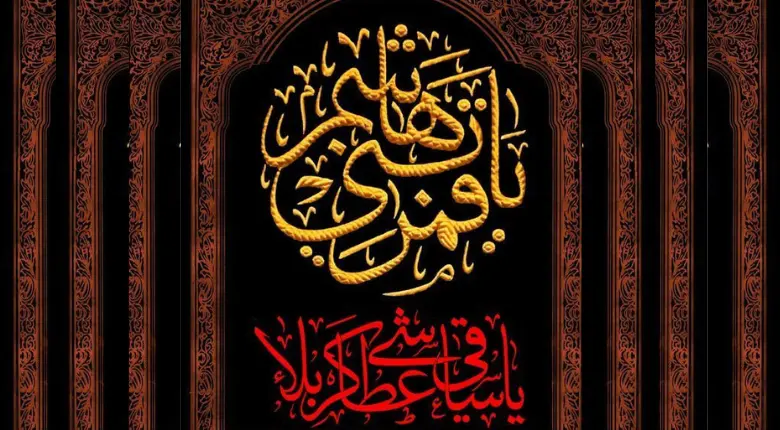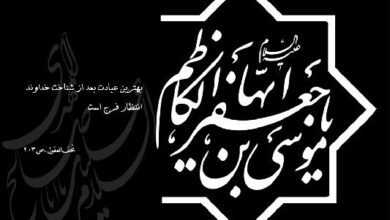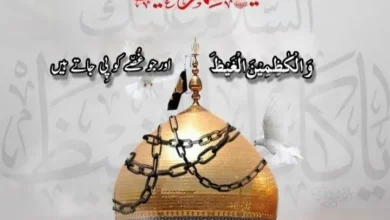
Background Of Moula Abbas as ‘s Mother Asws.
Moula Abbas is the bravest personality of Ahle bait. The Holy Prophet’s family had an unusual fate. Hashemies were persecuted despite their great honor and magnificence. Imam Ali (a.s.) was aware of Ashura when He opted to marry. He asked his brother, Aqil, who was a specialist in genealogy and was well-versed in the moral and spiritual characteristics and characteristics of numerous tribes and clans. He asked him to find him a suitable woman from a clan whose forefathers are among the strong and lionhearted men, so that such a lady may bear him a valiant and heroic son.
Then Hazrat Aqil introduced Amiralmomenin (a.s.) to a female from the Bani Kallab. Her name was Fatimah, she was the daughter of Hazam Ebne Khalid, and Her forefathers were all brave warriors. She was a lady, of gentle birth and aristocracy on both sides of Her family. Also known as Fatima Kallabia, and subsequently as “Ummolbanin,” which means “mother of boys.” She gave birth to four sons, one of them was Moula Abbas (as).
The Love of Hazrat Ummolbanin with Hassnain shareefain
It has been stated that when the Hassnain shareefain as and their sister called her Amman, She said, “Do not call me Amman, for not remembering your mother’s sorrows, Syeda Fatima (sa).” You may refer to me as your Kaneez.
After marrying Ameer ul Momeneen Ali ibn Abi Talib (as), she had four sons: Ghazi Abbas, Abdullah, Jafar, and Hanfiya. Hazrat Abbas Alamdar is the elder son of Moula Ali as and Hazrat Ommolbanin.
Hazrat Ommolbanin was motherly to Syeda Fatima Zahra’s (sa) cherished children, Imam Hassan, Hussain (as), Hazrat Zainab Aliya (sa), and Hazrat Umme KUlsom (sa), and addressed Herself as their kaneez. She was also extremely devoted to Ameer ul momineen (a.s.).
Her Advise for Karblala
When the Karbala event occurred, She was waiting for news from Kufa and Karbala. When She learned of her Son Shahadat, She immediately inquired about Imam Hussain (a.s.), who was more precious to Her.
Moula Abbas Ebne Ali (as) was the son of a thankful and honest lady, and He grew up with a father like Imam Ali Ebne Abitaleb (a.s.). He was destined for a destiny infused with the perfume of faith and the essence of belief and honesty.
The wildcat Mubarak of Moula Abbas (as) is Fourth Shaban 26 A.H . This day filled Imam Ali’s home and heart with optimism, for He knew that in the next Karbala event, He would be the standard-bearer and liegeman to his son, and Abbas, son of Ali, would exhibit sacrifice for Hussain, son of Janab e Hazrat Fatima (SA).
Early Life
Imam Ali (as) sometimes caressed the Moula Abbas, kissed His little arms, and cried. Hazrat Umul Banin (sa) once saw it and inquired as to why Imam was crying. Hazrat said, “These arms will be severed in order to assist His brother Hussain.” I’m crying for that day.
Moula Abbas (as) grew up in Hazrat Ali’s home with His dedicated and loyal mother, Imam Hassan and Hussain, and learned the wonderful principles of humanity, truthfulness, and morality from the pure family and the Holy Prophet’s household.
Without a doubt, Imam Ali’s (a.s.) training had an important part in the development of this youth’s notable mental and spiritual character, and His great comprehension sprang from such high training.
Imam Ali (a.s.) once had the young Abbas sit near him. Hazrat Zainab (sa) was also in attendance. Imam told the youngster, “Utter one (1).” One, according to Abbas. He asked him to say two (2) words. Abbas refrained from saying anything and instead stated, “I am ashamed to pronounce two with the tongue I have dubbed the Single God.” Imam Ali (a.s.) kissed Abbas after hearing this from the kid.
The wasiyat of Moula Ali as to him.
At the end of his life, on the night of 21 Ramadan, 41 A.H., Ali (a.s.) hugged Abbas and said, “My son, soon I shall be happy by you.” When Ashura arrives and you cross the Euphrates, do not drink water while your brother, Hussain (a.s.), is thirsty.
This was the first lesson He received on the night of Ali’s (a.s.) shahadat, and He never forgot it till Ashura.
When Imam Ali was leaving, His children gathered around His bed, worried about the future, and He gave advice to each of them. He most likely placed Abbas’ hand in Hussain’s (a.s.) and said, “O Abbas, your life and my Hussain’s life in Karbala!” Don’t abandon him!
Moula Abbas (as) worth stems from His fight, self-sacrifice, commitment, and knowledge of the Imam of the day. His significance stems from his patience and endurance, his unwillingness to take water although exhausted, and his standing over the river without any religious or customary restrictions on drinking water. The worth of those slain at Karbala stems from the fact that they fought for a good cause in the most severe circumstances anybody could conceive.
Al-Abd Al Saleh
‘Salutations upon you, O righteous worshipper who was obedient to Allah, His Messenger, Ameerul Momineen, Hasan and Husain (peace be upon all of them),’ says Imam Sadiq (a.s.) in the unique Ziarat of Moula Abbas (a.s.) transmitted on the authority of Abi Hamza-e-Somali from Imam Sadiq (a.s.).
Honorific Titles Of him
A summary of titles given is as follows:
- Abu al-Fadl Abbas(Lang. Farsi, Translation “Father of virtue”)
- Abul Qasim Moula Abbas (Lang. Arabic, Translation “Father of Qasim”)
- Abu Qurba (Lang. Arabic, Translation “The owner of the skin of water”)
- Shahen Shah-e-Wafa Moula Abbas (Lang. Urdu, Translation “Sultan of Loyalty”. Given by Shia’s belonging to the Indian Subcontinent)
- Qamar Bani Hashim Moula Abbas as (Lang. Arabic, Translation “Moon of the Hashemites”. His father, Ali ibn Abu Talib announced this title during battle of Siffin)
- Strength of Husayn
- Alamdar (Lang. Farsi, Translation “Flag bearer”. Husayn announced this title during battle of Karbala)
- Saqqa (Lang. Arabic, Translation “Who Fetches Water”. Sakina bint Hussain called him through this title during the battle of Karbala.)
- Afza sh-Shuada (Lang. Arabic, Translation “Most Superior Martyr”)
- Babul Hawa’ij Moula Abbas as(Lang. Arabic, Translation “The door to fulfilling needs”. In accordance with Shi’as, three persons are awarded with this title (Abbas ibn Ali, Ali Asghar ibn Hussain, and seventh Shia Imam Musa al Kazim). [18][2]
‘Aabid’ implies a worshipper or a devoted worshipper in Arabic.
‘The worshipper, who has dedicated his entire life to the service of his lord and has never left him.’ Al-Munjid (p. 316).
‘Abd’ , signifies a worshipper of Allah in Arabic. On one level, we are all worshippers of Allah since Allah created man to adore Him.
56 (Surah Zaariyaat),
However, some worshippers have excelled in worship to the point that Allah is proud of them and considers them to be His worshippers. In the Quran, Allah mentions numerous Prophets by name. However, not all of them are “Abd.” Only a few Prophets are ‘Abd’ by Allah in the Quran – Hazrat Nuh (a.s.) in Surah Israa: Verse: 3, Hazrat Dawood (a.s.) in Surah Swaad: Verse: 17, and Hazrat Ali (a.s.).
Zakariyya (a.s.) in Surah Maryam: Verse 2, Hazrat Isa (a.s.) in Surah Nisa: Verse 20, Hazrat Ayyub (a.s.) in Surah Swaad: Verse 41, and our beloved prophet Muhammad (s.a.w.a.) in Surah Israa:
Verse 1.
The position of servitude is coveted, and only a few of Allah’s most cherished creatures may get it. When Hazrat Jibraeel (a.s.), descended on earth to deliver the divine word to the Prophet, he said, ‘Allah has sent His welcomes and salutations to you. He has given you the option of being His slave or the ruler of the entire universe.’
The Holy Prophet (s.a.w.a.), expectedly chose the position of service and abandoned the authority to control the world. That is why, in all required and recommended prayers, we first witness the Prophet’s status as Allah’s slave before testifying to his prophethood.




